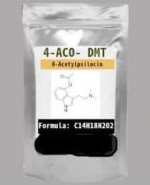In the search for new ways to treat mental health disorders and deepen human understanding of consciousness, psychedelics are making a remarkable comeback. Among these compounds, 4-AcO-DMT stands out as a promising, though still mysterious, molecule.
Often referred to as the “synthetic psilocin” or “smoother magic mushrooms,” 4-AcO-DMT could potentially offer a new path for treating depression, anxiety, trauma, and even existential suffering. But what exactly is it—and how might it help us?
4-AcO-DMT (4-Acetoxy-N,N-dimethyltryptamine) is a semi-synthetic psychedelic substance first developed in the 1960s by Albert Hofmann—the same chemist who discovered LSD. Chemically, it is a prodrug to psilocin, the active compound found in magic mushrooms. When ingested, it is believed to metabolize into psilocin, producing effects similar to psilocybin mushrooms.
Despite its structural similarity to psilocybin, many users report a more gentle, dream-like, and emotionally introspective experience with 4-AcO-DMT.
Research into psychedelics like psilocybin has shown promise in treating:
Since 4-AcO-DMT is closely related to psilocin, it is believed to work in a similar way—stimulating serotonin receptors, particularly the 5-HT2A receptor, which plays a role in mood regulation and perception.
Users often report emotional catharsis, self-acceptance, and new perspectives following 4-AcO-DMT experiences, especially in supportive environments.
Often referred to as the “synthetic psilocin” or “smoother magic mushrooms,” 4-AcO-DMT could potentially offer a new path for treating depression, anxiety, trauma, and even existential suffering. But what exactly is it—and how might it help us?
What Is 4-AcO-DMT?
4-AcO-DMT (4-Acetoxy-N,N-dimethyltryptamine) is a semi-synthetic psychedelic substance first developed in the 1960s by Albert Hofmann—the same chemist who discovered LSD. Chemically, it is a prodrug to psilocin, the active compound found in magic mushrooms. When ingested, it is believed to metabolize into psilocin, producing effects similar to psilocybin mushrooms.
Despite its structural similarity to psilocybin, many users report a more gentle, dream-like, and emotionally introspective experience with 4-AcO-DMT.
How 4-AcO-DMT May Help Humans
https://psychedelicslovershop.com/1. Mental Health Support
Research into psychedelics like psilocybin has shown promise in treating:
Since 4-AcO-DMT is closely related to psilocin, it is believed to work in a similar way—stimulating serotonin receptors, particularly the 5-HT2A receptor, which plays a role in mood regulation and perception.
Users often report emotional catharsis, self-acceptance, and new perspectives following 4-AcO-DMT experiences, especially in supportive environments.

